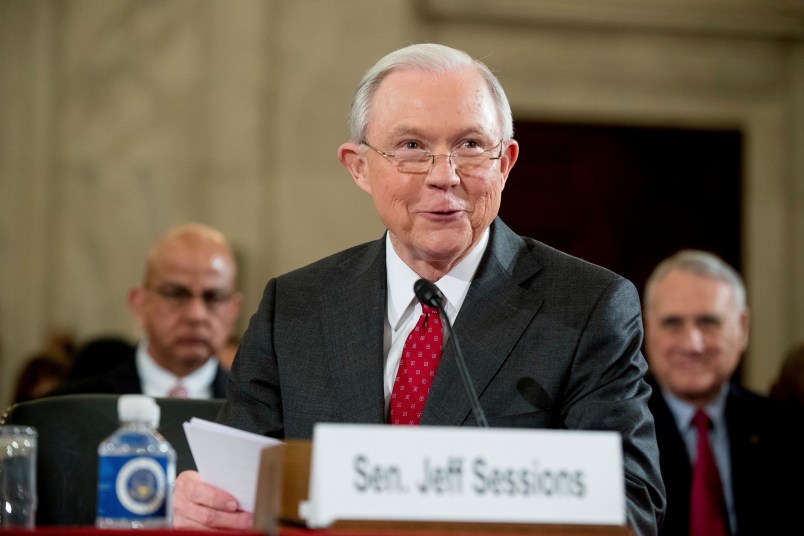I don’t have a clear sense of how big a deal last night’s Jeff Sessions news will turn out to be. And I mean that both substantively – how much does it really matter? – and more generally – how will it be perceived, what effect will it have on the course of the broader story? As I wrote last night, this is much more about Sessions’ need to conceal the meeting than the meeting itself.
My biggest takeaway is that this scandal has all the attributes of the vast and shattering scandals in which people who at least appear to have only indirect or limited roles themselves keep getting pulled under or compromised by it. I know “vast and shattering” is a pretty portentous phrase. Certainly, this revelation itself doesn’t shake anything to its foundations. But why did Sessions have this meeting at all? It seems at best ill-conceived, coming in the heat of allegations of inappropriate connections between Trump and Russia last Fall.
Far more baffling, why did he choose to conceal it?
Sessions and his aides claims this morning that a) he forgot or b) that he met with a lot of other ambassadors so it doesn’t matter or c) that it somehow didn’t count as a meeting because they didn’t discuss the election are all either off-point or ridiculous. It is no more than pretty transparent after-the-fact caviling. Any contact with senior Russian officials was going to be scrutinized in this context. Concealing it would set off alarm bells.
A bit of the timeline here is helpful. Sen. Franken’s question to Sessions was on January 10th. Sen. Leahy asked a slightly different question. But I’m not sure of the precise date. It was on January 12th that the Post’s David Ignatius first reported that Flynn had been in contact with Ambassador Kislyak on the day President Obama announced retaliatory sanctions against Russia. If Leahy’s question was also before the 12th (they were written questions, so possible), that was before the issue of Kislyak specifically became a charged public issue. But Sessions actual confirmation vote came almost a month later, plenty of time to revise his testimony.
Why are there so many unforced errors? Why conceal this meeting? Frankly, why lie about it? As I said, big, big scandals work like this. People who don’t even appear to be that close to the action keep getting pulled under for what seem like needless deceptions. The answer is usually that the stuff at the center of the scandal is so big that it requires concealment, even about things distant from the main action, things that it would seem much better and less damaging simply to admit.
We’ve all heard the old saw: It’s never the crime, it’s the cover-up. This is almost never true. Covering scandals for any length of time is enough to tell you that. People are generally able to make judgments about how much trouble they’re in. We think the ‘cover up’ is worse than the crime because it’s actually very seldom that the full scope of the actual crime is ever known. The cover up works better than you think. The other reason the cover up is a logical response is that it usually works. You only find out about it when it doesn’t. So it’s a good bet.
Astronomers can’t see black holes directly. They map them by their event horizon and their effect on nearby stars and stellar matter. We can’t see yet what’s at the center of the Trump/Russia black hole. But we can tell a lot about its magnitude by the scope of the event horizon and the degree of its gravitational pull, which is immense.






